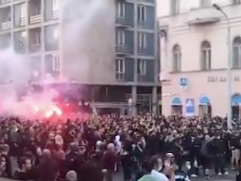‘The government always tries to find an enemy for the people’: Activists condemn anti-Roma narrative in Hungary
Rights groups slam ‘scapegoating’ of community over murder of two boys, despite no evidence of Roma involvement, as Zoe Tidman reports


Last May, hundreds took to the streets in a town outside of Budapest to protest against what they called “Roma crime”, in what observers feared was a return to the turbulent period for Roma-Hungarian relations of a decade ago.
Fast forward to this summer, and activists say similar scenes have again erupted – but this time in the centre of Hungary’s capital.
Despite the threat of coronavirus, people flocked outside the National Roma Council in late May after two boys were murdered in a fight in Budapest – although Roma organisations say there was no evidence the attackers were Roma.
“No one still really knows if the people who stabbed these two boys were Roma or not – but that’s kind of not the point,” Jonathan Lee from the European Roma Rights Centre (ERRC) tells The Independent.
He added: “Normally it’s a stabbing which happens in Hungary, and almost immediately you get these dog whistle [comments] in Hungary talking about Gypsy criminality – before anything is known about it.”
Crowds chanted “racist slogans” at the National Roma Council before heading to the square where the murders happened, Lee says.
Football fans had already gathered at the square for a separate memorial event, one larger in size, where chants against Gypsy crime could be heard, according to Hungarian media.
Our Homeland Movement, a far-right party whose president claimed the attackers were mostly Roma on Twitter days before, had called on people to meet outside the National Roma Council for a “parade against crime” in memory of the murdered teenagers.
Lee from the ERRC says the far-right group have a “history” of holding similar rallies – like the one against “Roma crime” in May last year, which was sparked after a fight between a Roma man and non-Roma locals in a bar.
Campaigners say speculation about the ethnicity of the murderer or murderers is being used to attack the Roma community as a whole. (Budapest Police told The Independent they do not record ethnicities when asked about claims the murder suspect was Roma.)
“This was a collective scapegoating of a persecuted and stigmatised community for an individual’s criminal activity,” Zeljko Jovanovic, the director of the Open Society Roma Initiatives Office, says, adding the ethnicity of the attackers was not even clear.
A video on Our Homeland Movement’s Youtube shows a party official speaking outside the National Roma Council, with the caption mentioning “Gypsy crime” and the redirection of money away from Roma integration programmes.
“The far-right always try to push this anti-Roma rhetoric and narrative,” Jeno Seno from Idetartozunk Egyesulet, a campaign group for Roma rights in Hungary, tells The Independent.
“They never talk about the crimes committed by the non-Roma. They only want to bring out these violent crimes where they think the perpetrator was Roma.”
Jovanovic says the prime minister, Viktor Orban, has fanned the flames of the protesters who took to the streets in May, saying he “uses racism against the Roma as a vehicle to attract far-right voters”.
“In the recent past, he has stepped up his anti-Roma rhetoric,” the director says.
Earlier this year, Orban called unfair a Supreme Court ruling awarding financial damages to Roma families after their children were found to have been unlawfully segregated for years in eastern Hungary.
Orban had said the school in Gyongyospata was trying to prevent Roma children from bullying others, and sparked protests in Budapest earlier this year when he suggested the state should ignore any order to pay compensation and offer training instead.
He also said everyone must work to receive money.
“It was really nasty,” one Roma activist in Hungary tells The Independent. “He said these Roma families will receive money without any work and that is outrageous.”

He says it was a “conscious move” to play into people’s stereotypes about Roma communities, given the ”general view that Roma people are lazy, don’t work, exploiting social benefits”.
A Pew survey last year found more than 61 per cent of Hungarians said they had an “unfavourable” view towards Roma communities, and those who support right-wing populist parties across Europe were more likely to have a negative opinion.
Lee from the Roma-rights group ERRC says there is a “climate of anti-gypsyism” which allows far-right rallies to take place, which he says “does not happen in a vacuum”.
“The way Fidez [the ruling party] has been operating in recent years is there is always an imagined enemy of the state,” he says.
“A long time ago it was Roma, then it became Muslim migrants at the border, then when there were no more migrants to demonise it became George Soros and Soros-funded institutions,” he says.
“We are now basically at the point where there are no migrants in the country, Orban has chased all our the Soros organisations out the country. Attention was sent back to Roma again.”
Lee adds: “From top to bottom, there is within Hungarian politics there is an acceptable level of racist rhetoric from mainstream politicians which only emboldens these far-right fringes.”
“The government is always trying to find an enemy for the people,” campaigner Seno says, echoing Lee. “Now they have gone back to the Roma, as there are no migrants to point the finger at.”
He says anti-Roma sentiment is their “Trump card”. “The far-right is basically what you see on the streets, but the government is pushing this,” he says.
Rights activists say Roma in Hungary, who make up 5-7 per cent of the population, live in disproportionate poverty, suffer from prejudice in schools and workplaces and have been subject to intimidation and occasionally deadly violence by the far right.
“In terms of discrimination and institutional racism, it is authorities in power who are responsible for the most harm to Romani people, whether it is school segregation, access to water, institutional racism in health care and police,” Lee says. “This is where the real damage is done.”
“The far-right hate crimes are just a more visible manifestation of a much wider societal prejudice which blights the lives of so many Roma every day.”
A Hungarian government spokesperson said: ”Prime minister Viktor Orban made it clear already in 2008 that crime has no ethnicity, there is no Roma crime, there are Roma criminals. It is the duty of the state to take action against anyone who commits a crime.”
They added Orban’s administration “outlawed paramilitary organisations that intimidated Roma communities, including the far-right, radical Jobbik party’s notorious Hungarian Guard Movement” ten years ago and the government has introduced legislation to ban hate speech against communities and individuals.
Our Homeland Movement have been approached for comment.
Join our commenting forum
Join thought-provoking conversations, follow other Independent readers and see their replies
Comments
Bookmark popover
Removed from bookmarks